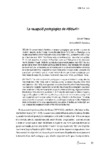Mostrar o rexistro simple do ítem
La recepció pedagògica de Hölderlin
| dc.contributor.author | Vilanou, Conrad | |
| dc.date.accessioned | 2011-07-12T11:34:08Z | |
| dc.date.available | 2011-07-12T11:34:08Z | |
| dc.date.issued | 2001 | |
| dc.identifier.citation | Sarmiento Anuario galego de historia da educación, 2001, 5: 21-43. ISSN: 1138-5863 | es_ES |
| dc.identifier.issn | 1138-5863 | |
| dc.identifier.uri | http://hdl.handle.net/2183/7749 | |
| dc.description.abstract | [Abstract] This work analyses the pedagogical reception 01 Hólderin's poetry alter the First World War (1914-1918), both in Germany during the Weimar Republic (1919-1933) and Catalonia (1920-1939). It was precisely during the Great War, when Franz Rosenzweig, the philosopher, located a Iragmentary text entitled Das alteste Systemprogramm des deuts- chen Idealismus (1796), which compiles the youthlul ideas 01 Schelling, Hegel and Hólderin. The linding 01 this document, published in 1917, and the rediscovery 01 Hólderin's poetry, lorgotten throughout the 19th century, stirred up a criticism 01 mechanical reasoning which had established itsell in western culture lrom the age 01 the Scientilic Revolution. This whole group 01 events encouraged the irruption 01 a poetic lagos (poetry as master 01 humanity) which, in the midst 01 the crisis experienced by the culture 01 the first hall 01 the 20th cen- tury, stressed the creative dimension 01 the child within the mano | es_ES |
| dc.language.iso | cat | es_ES |
| dc.publisher | Universidade da Coruña | es_ES |
| dc.title | La recepció pedagògica de Hölderlin | es_ES |
| dc.type | info:eu-repo/semantics/article | es_ES |
| dc.rights.access | info:eu-repo/semantics/openAccess |






